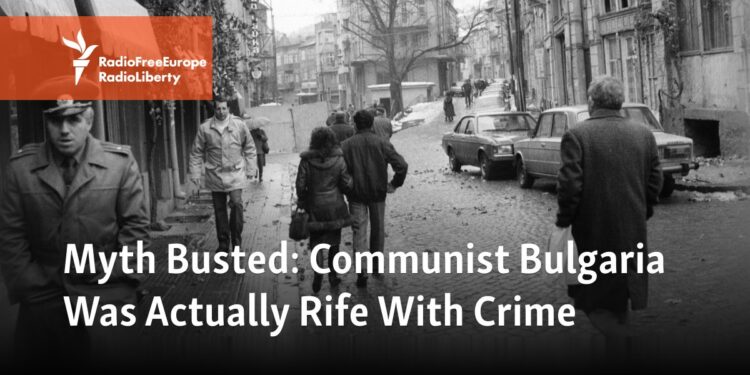Bulgaria in 1978
His findings reveal several periods of rising crime. For instance, thefts increased during the period of collectivization in 1944-59, when communist authorities were aggressively confiscating agricultural lands from owners. “Basic goods” like food and clothes were being stolen — and kept rather than resold, according to the Interior Ministry figures — which Ivanov says points to a more prolonged food crisis in Bulgaria after World War II than in much of the rest of Europe. “People stole to eat and to have clothes to wear,” he said.
Other figures not made public under communism point to a connection between collectivization and mass migration from agricultural areas to Sofia and other big Bulgarian cities. “This is also a criminogenic factor and increases the number of crimes,” the author said.
Ivanov argues that censorship and the official concealment of information about criminality, including acts such as terrorism that targeted society more broadly, served to lull the public into a misleading sense of security. “People lived in the deceptive calm that everything was OK and that made it easier for criminals [to operate],” he said.
Tihomir Bezlov, a crime researcher and senior analyst at the Center for the Study of Democracy, a public-policy institute in Sofia, praises Ivanov’s book and said part of what makes it “profoundly engaging” is that many of its statistics were hidden from view for so long. “Consequently, the average Bulgarian citizen often perceives the communist era as a time devoid of crime,” Bezlov said. “For instance, [the book] delves into the presence of serial killers, a topic no one talked about before 1990.”
Bezlov said Ivanov’s interviews with former investigators, close tracking of specific cases, and “descriptions of unchecked violence against suspects” all shed light on communist-era crime and how it was solved in Zhivkov’s Bulgaria.
But he expressed doubt “that one or even several books can alter the tendency to romanticize the past.”
Bezlov also says he was struck by the disparity revealed in Ivanov’s book between the size of the People’s Militia, which was the criminal police agency with around 10,000-12,000 officers, and State Security (DS), Bulgaria’s equivalent of the Soviet KGB, and its 200,000 or so agents. “In this context, State Security ranked third in the Soviet bloc, trailing behind [in size] the East German Stasi and the Romanian Securitate,” Bezlov said.
There is little doubt that the lack of news and statistics on murder, robbery, and other crimes hid much of it from the eyes of the public, Bezlov says, but it was also because “socialist societies were believed to be fair, with minimal poverty and unemployment.” The lack of media coverage of crime before 1990 is “a crucial factor [that] warrants investigation,” he said, especially since it “stands in stark contrast to the media landscape after 1990” with its headlines and newscasts dominated by crime.
Bezlov said many Bulgarians’ perceptions of life after communism were “influenced by the significant trauma of high crime rates in the 1990s,” when the murder rate was a “staggering” 5.8 per 100,000, nearly on par with the United States, which in 2022 had 6.3 murders per 100,000 people.
The current rate in Bulgaria is a moderate 1.3. Nevertheless, Bezlov added, “individuals residing in Bulgaria still harbor the perception that crime rates in the country remain alarmingly high.”
Ivanov, too, notes the rise in crime in the initial years of democratic transition. But, he added: “Nothing starts by itself. All this is a process.”
Written and with reporting by Andy Heil based on reporting by Georgi Angelov of RFE/RL’s Bulgarian Service
Source link : https://www.rferl.org/a/bulgaria-myths-communism-crime/32892693.html
Author :
Publish date : 2024-04-05 07:00:00
Copyright for syndicated content belongs to the linked Source.


